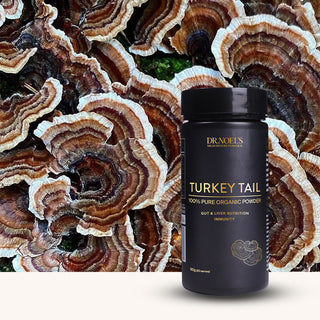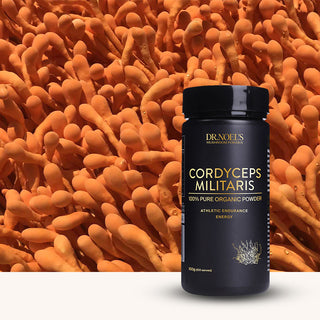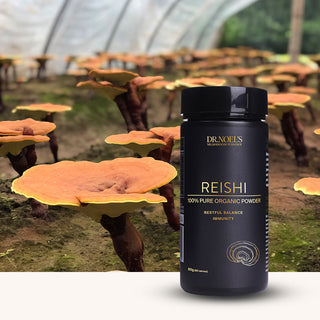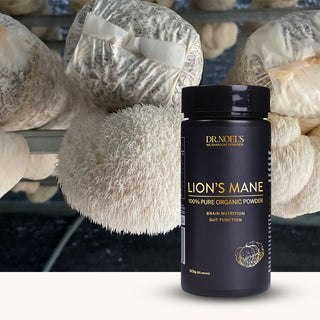Diabetes mellitus is a long-term autoimmune disease affecting how well your body uses food—especially sugar and carbs—to produce energy. When the carbohydrates in the diet are broken down into sugars, the pancreas releases a peptide hormone, insulin, which allows your cells to take in sugars and use them for energy. People with diabetes either produce insufficient amounts of insulin or have trouble utilizing it appropriately.
There will be 643 million adults with diabetes by 2030, with 537 million already living with the disease, necessitating the use of supplements. Research points to the beneficial effects of Turkey tail mushrooms on blood sugar control.
Turkey tail mushrooms will likely provide potential health benefits since they contain bioactive substances like beta-glucans and polysaccharopeptides. These compounds may have anti-diabetic effects, such as lowering blood sugar and enhancing insulin sensitivity.
In addition to lowering blood sugar levels, the mushroom compounds may help lower blood lipid levels, inhibit bone deterioration induced by diabetes, and improve cardiac function in diabetic cardiomyopathy.
The post explores how the mushroom helps keep blood sugar under check and prevents diabetes-associated complications.

Exploring The Science Behind Turkey Tail Benefits For Diabetes
Several studies carried out in vitro (in laboratories) and on animals have generated promising results about the possible anti-diabetic properties of Turkey Tail mushrooms. For instance, some research suggests that Turkey Tail mushroom bioactive components may help improve insulin resistance, lower blood glucose levels, and reduce complications associated with diabetes.
Turkey Tail may lower blood sugar levels
Polysaccharopeptides derived from Turkey tail mushrooms have been shown to improve glucose uptake in cells. In a 2020 study, Trametes versicolor was tested for its capacity to maintain glucose homeostasis in type 2 diabetes.
Here, male Wistar rats were fed a high-fat diet, then followed up with streptozotocin injection to induce type 2 diabetes. Then, the rats were orally given extracts of Turkey tail mushroom. Blood sugar levels in the rats were reduced four weeks after they were administered the mushroom extract. Furthermore, the insulin resistance indicators and the oral glucose tolerance test improved.
In addition, the mushroom lowered oxidative stress in rats and displayed anti-hyperlipidemic properties. The findings demonstrated that Turkey tail can help avoid the onset of diabetes-related complications.
Turkey Tail may lower blood lipid levels
Another study looked into the anti-diabetic effects of an alcoholic extract of Turkey tail on mice. The study group demonstrated significant reductions in blood glucose and lipid levels compared to the animals who did not get the mushroom. Biopsies also revealed that the group who received the mushroom had less liver tissue damage. The findings suggested that Turkey tail could successfully prevent diabetes and protect the liver.
In a study from 2015, researchers investigated the bone properties of polysaccharides of Trametes versicolor in rats with diabetes. Forty-five male Sitar rats were fed either a high-fat diet or a chow diet that acted as a control for the 28-day study period. Animals receiving high-fat diets were injected with streptozotocin and nicotinamide to induce diabetes mellitus. The rats with diabetes were divided into two groups, one receiving distilled water and the other receiving Trametes versicolor.
Turkey Tail may inhibit bone deterioration induced by diabetes
The mushroom lowered postprandial blood sugar and reduced bone deterioration induced by diabetes. Researchers conclude that the study demonstrated the protective effect of Turkey tail polysaccharides on bone properties, which was partly mediated by the improvement of hyperglycemic control in rats with diabetes.
Patients with type 2 diabetes mellitus usually have poor immunity and are likely to suffer from microbial infections and cancer. In 2017, scientists reported an efficient anti-diabetic medicinal mushroom, or Coriolus versicolor.
This study aimed to investigate the anti-diabetic and anti-insulin-resistance effects of the extract of Coriolus in skeletal muscle and primitive muscle cells (myoblast) of rats with type 2 diabetes.
Study results showed that treatment with Turkey tail extract significantly reduced blood glucose levels of the rats, whereas the mushroom extract increased glucose consumption in insulin-resistant cells.
Besides, other parameters indicated that Turkey tail extract was effective in diabetic skeletal muscle. Moreover, treatment with the mushroom extract resulted in remarkable anti-insulin-resistance effects.
Turkey Tail may improve cardiac activity
A more recent study from 2019 has looked at the effect of Coriolus versicolor on diabetic cardiomyopathy, a diabetes-associated condition that can result in heart failure.
Here, researchers aimed to investigate the effect of Turkey tail on cardiac function in rats with diabetes mellitus. They found that the treatment with mushroom extract markedly improved the cardiac dysfunction of rats.
The administration of Turkey tail extract significantly attenuated cardiac fibrosis and alleviated cardiac inflammation. Therefore, researchers conclude Turkey tail has a protective effect on diabetic cardiomyopathy.
Benefits Of Turkey Tail Mushroom
Turkey tail is an excellent source of prebiotic fibers and unique antioxidants. It may improve intestinal health, combat cancer, and reduce blood sugar levels.
The mushroom has been chiefly researched for its anti-cancer properties; approximately 180,000 patient volunteers with breast, esophageal, colorectal, and stomach cancer participated in more than 40 research trials. The primary anti-cancer components of this mushroom are polysaccharide peptide (PSP) and polysaccharide-K (PSK). PSP primarily functions as a moderator of biological reactions. It activates the immune system to combat “oncoviruses,” or tumor viruses, on the body’s behalf. PSK extract, or “krestin,” also boosts immunity and may block many cancer-initiating pathways.
Prebiotic fiber from Turkey tail helps improve gut health. Probiotics, or healthy bacteria, rely on prebiotics as their “fuel.” This may help with digestive disorders like constipation and diarrhea.
Furthermore, studies are looking at the potential benefits of Turkey tail for improving athletic performance, preventing bacterial and viral infections, and lowering fatigue. Turkey tail advocates assert that it can safeguard against age-related cognitive decline and prevent urinary tract infections (UTIs).
Turkey tail mushrooms are said to have health benefits because of their bioactive components, which are only found in high-quality supplements. Selecting a high-quality Turkey Tail mushroom supplement might be difficult due to the abundance of options on the market. Still, there are a few essential factors to consider when choosing a good quality mushroom supplement.
Mycelium produced on grains has a high carbohydrate content and a low beta-glucan content. Its ability to generate these secondary metabolites is minimal or nonexistent. Therefore, Turkey tail products made from mycelial sources are like purchasing grain starch, which is primarily filler.
Look for mushroom products that have passed safety tests, such as those for pesticides and heavy metals, to guarantee their suitability for consumption. Select mushrooms from farms that have earned organic certification through the USDA and EU programs.
FAQs About Turkey Tail Diabetes Benefits
Is Turkey Tail Mushroom Powder Good For Diabetes?
Turkey tail mushroom powder lowers the body’s glucose levels, which helps control diabetes. Additionally, the mushroom helps reduce insulin resistance, which makes it easier for the liver, fat, and muscles to absorb glucose from the blood.
Is It Safe To Take Turkey Tail Every Day For Diabetes?
The recommended daily dosage of 2000 to 3000 mg of Turkey tail mushrooms should be consumed for real health benefits. Unless you have a mushroom allergy, Turkey tail mushrooms are generally considered safe to eat for an extended time.
How Quickly Does Turkey Tail Work For Diabetes?
Generally, Turkey tail mushrooms are used as tonics to help various organs and systems over time. Benefits could appear in as little as one to two weeks, while they might take longer to show up over two to three months.
Is It Okay To Take Turkey Tail Mushrooms With Anti-Diabetes Medication?
Mixing diabetic medication with turkey tail mushrooms could result in dangerously low blood sugar levels. Keep a close watch on your blood sugar. Before taking Turkey tail, always check with a healthcare professional to ensure the supplement and dosage are right.
Conclusion
Research has shown that polysaccharopeptides found in Turkey tail mushrooms have antihyperglycemic qualities that may help prevent diabetes. They function by enhancing glucose transit and lowering oxidative stress to decrease inflammation.
The mushroom also helps lower blood lipid levels, protects the liber and prevents diabetes-related complications of the bone. It can also help improve cardiac activity, with a protective effect on diabetes-associated cardiomyopathy.
References
1. International Diabetes Federation. IDF Diabetes Atlas.
2. International journal of medicinal mushrooms. Extracellular Polysaccharopeptides from Fermented Turkey Tail Medicinal Mushroom, Trametes versicolor (Agaricomycetes), Mitigate Oxidative Stress, Hyperglycemia, and Hyperlipidemia in Rats with Type 2 Diabetes Mellitus.
3. Journal of Mazandaran University of Medical Sciences. Anti-diabetic Effect of Methanol Extract of Trametes versicolor on Male Mice.
4. Journal of Agricultural and Food Chemistry. Polysaccharides of Trametes versicolor Improve Bone Properties in Diabetic Rats.
5. Phytotherapy Research. Coriolus versicolor aqueous extract ameliorates insulin resistance with PI3K/Akt and p38 MAPK signaling pathways involved in diabetic skeletal muscle
6. Phytotherapy Research. Coriolus versicolor alleviates diabetic cardiomyopathy





